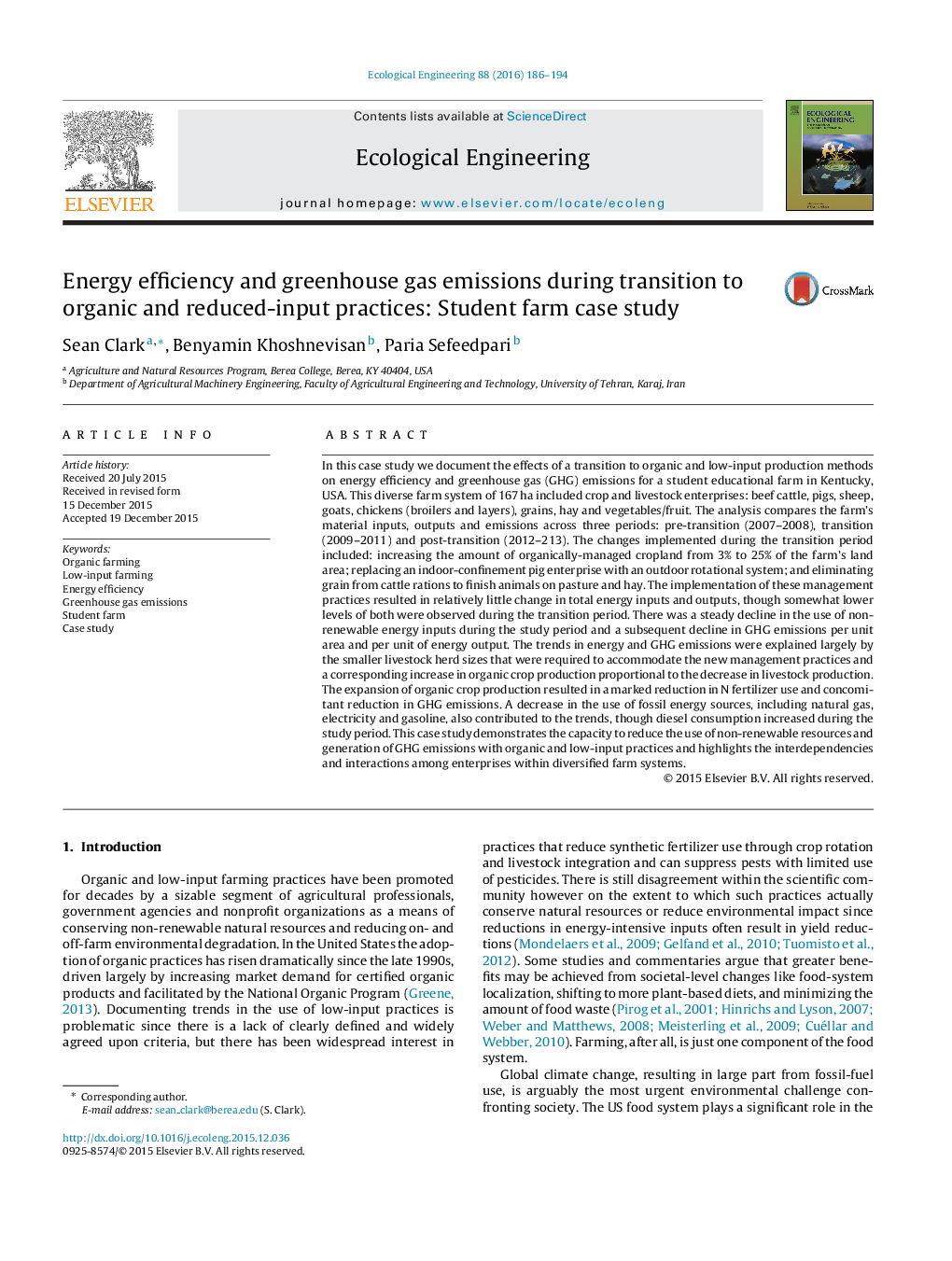| کد مقاله | کد نشریه | سال انتشار | مقاله انگلیسی | نسخه تمام متن |
|---|---|---|---|---|
| 6301557 | 1618011 | 2016 | 9 صفحه PDF | دانلود رایگان |
عنوان انگلیسی مقاله ISI
Energy efficiency and greenhouse gas emissions during transition to organic and reduced-input practices: Student farm case study
ترجمه فارسی عنوان
بهره وری انرژی و انتشار گازهای گلخانه ای در طی گذار به روش های آلی و کاهش تولید: مطالعه موردی مزرعه دانشجویی
دانلود مقاله + سفارش ترجمه
دانلود مقاله ISI انگلیسی
رایگان برای ایرانیان
کلمات کلیدی
کشاورزی ارگانیک، کشاورزی کم درآمد، بهره وری انرژی، انتشار گازهای گلخانه ای، مزرعه دانشجویی، مطالعه موردی،
موضوعات مرتبط
علوم زیستی و بیوفناوری
علوم کشاورزی و بیولوژیک
بوم شناسی، تکامل، رفتار و سامانه شناسی
چکیده انگلیسی
In this case study we document the effects of a transition to organic and low-input production methods on energy efficiency and greenhouse gas (GHG) emissions for a student educational farm in Kentucky, USA. This diverse farm system of 167Â ha included crop and livestock enterprises: beef cattle, pigs, sheep, goats, chickens (broilers and layers), grains, hay and vegetables/fruit. The analysis compares the farm's material inputs, outputs and emissions across three periods: pre-transition (2007-2008), transition (2009-2011) and post-transition (2012-213). The changes implemented during the transition period included: increasing the amount of organically-managed cropland from 3% to 25% of the farm's land area; replacing an indoor-confinement pig enterprise with an outdoor rotational system; and eliminating grain from cattle rations to finish animals on pasture and hay. The implementation of these management practices resulted in relatively little change in total energy inputs and outputs, though somewhat lower levels of both were observed during the transition period. There was a steady decline in the use of non-renewable energy inputs during the study period and a subsequent decline in GHG emissions per unit area and per unit of energy output. The trends in energy and GHG emissions were explained largely by the smaller livestock herd sizes that were required to accommodate the new management practices and a corresponding increase in organic crop production proportional to the decrease in livestock production. The expansion of organic crop production resulted in a marked reduction in N fertilizer use and concomitant reduction in GHG emissions. A decrease in the use of fossil energy sources, including natural gas, electricity and gasoline, also contributed to the trends, though diesel consumption increased during the study period. This case study demonstrates the capacity to reduce the use of non-renewable resources and generation of GHG emissions with organic and low-input practices and highlights the interdependencies and interactions among enterprises within diversified farm systems.
ناشر
Database: Elsevier - ScienceDirect (ساینس دایرکت)
Journal: Ecological Engineering - Volume 88, March 2016, Pages 186-194
Journal: Ecological Engineering - Volume 88, March 2016, Pages 186-194
نویسندگان
Sean Clark, Benyamin Khoshnevisan, Paria Sefeedpari,
